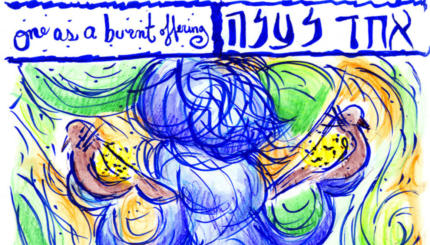My teen never calls, she only texts. So when she does call, I always answer.
“What is that thing you say when I don’t know how to do something?” she asks.
Momentarily puzzled, I realize what she is searching for, “An emerging skill.”
“Yes,” she replied adding before she hung up, “that is exactly it.”
The New Year has started. We have considered our past behaviors and made commitments to do better.
But let’s face it, if it were easy to do, I would already be doing it.
Why not give up before I start?
My daughter’s call came the day before Yom Kippur. I was feeling a bit down. I was deep in thought about the places my own behavior had fallen short this past year. My review of the state of the world left me worried on many fronts, sure that there was more to do, and unsure what I ought to be doing.
Her quick question recentered me.
When I first encountered the ES -Emerging Skill designation on a report card nearly 20 years ago it seemed one of those newfangled absurdities that was simply a nice way of saying your kid can’t do this or that, a softer gentler form of the F of my childhood. But in the process of raising children, I have come to embrace its simple brilliance. Many of the things my children could once not do at all have with time emerged as skills and sometimes even strengths.
For me the concept of emerging skills ties directly in the work of Dr. Carol Dweck a psychologist at Stanford who advocates a growth mindset for learning. Instead of “I can’t,” she encourages educators not to get stuck in what is, but to imagine what is possible. Instilling this approach in students helps them to envision potential in place of limitations.
It turned out, my teen needed the phrase for one of the college essays about her strengths and weaknesses. Instead of claiming a weakness, she framed a lack of capacity as an emerging skill. After all, who is to say she won’t be able to do this or that sometime in the future.
As I contemplated the challenges set to me by the Rosh Hashana and Yom Kippur liturgy, I was thinking about how Jewish the growth mindset is and how it can help us set a course for the New Year. There is always so much we are not doing. Between caring for the sick, saying a daily prayer, brushing and flossing and daily exercise the list of Torah and daily to-dos is so long that inevitably we are not doing all of them. And if it is impossible, so why not admit defeat and get on with things as they already are?
One of the classic modern Yom Kippur stories relates a young Franz Rosenzweig in turn of the century Germany. As a young man growing up in the late 1880s Germany, he was disillusioned with Judaism. On his way to being baptized, he stopped into a synagogue. Apparently, the sounds and liturgy of the Kol Nidrei touched him profoundly and helped him return to Jewish life eventually becoming one of the leading modern Jewish philosophers. But in returning to Jewish life, he still struggled with elements of tradition. Later in life, he was asked about whether he fulfilled the daily obligation of tefillin he famously answered, “Not yet.”
Just because you have never done it before, does not mean you never will.
We need not despair; Even if we are not doing that thing we know we are meant to be doing, or want to be doing, or could be doing. We need not get stuck in a fixed mindset, seeing ourselves or our lack of capacity as a failure.
Instead, as we make our way into this new day, new week, new year, do as my daughter did, mark your weaknesses as emerging skills. Label those things you have yet to do as “not yet.” And embrace a growth mindset.



